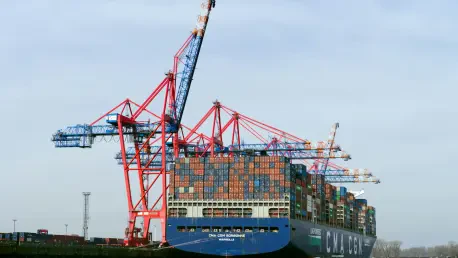In the ever-changing world of global trade, U.S. importers face numerous challenges, from geopolitical tensions and supply chain disruptions to fluctuating tariffs. These issues not only impact operational costs but also have significant implications for cargo insurance. The uncertainty surrounding tariffs, in particular, has introduced complexities that necessitate a thorough understanding of current issues to ensure adequate insurance protection.
1. Grasp the Extent of Coverage
Understanding the scope of your cargo insurance coverage is crucial, especially given the complexities introduced by fluctuating tariffs. Not all cargo insurance policies are created equal, and it’s essential to comprehend what risks are covered and, more importantly, what’s excluded. Common exclusions might include specific types of goods, certain routes, or particular perils like acts of war or natural disasters. For instance, some policies may not cover losses due to improper packaging or inherent vice (the natural characteristics of the goods that might cause deterioration).
Insurers may exclude coverage for particular transit routes that pass through high-risk areas or for goods susceptible to damage. Hence, importers must meticulously analyze the fine print and seek clarity from their insurers regarding any ambiguities. By understanding these exclusions, importers can make informed decisions about additional coverages necessary to mitigate their specific risks. Moreover, remaining informed about the extent of coverage ensures that businesses are not caught off guard during claim settlements.
2. Precisely State Cargo Value
Accurately declaring the value of imported cargo is vital in maintaining adequate insurance coverage amid rising tariff-related costs. Misjudging the worth of your cargo to cut down on premiums can be an expensive error. In case of a claim, the insurer will compensate only up to the stated value, potentially leaving significant financial exposure due to the shortfall. Ensuring that the declared value mirrors the actual cost of the goods, including expenses like shipping, handling, and potential profit margins, is pivotal.
Rising tariffs increase the total landed cost of goods, as duties, taxes, and fees contribute to the overall value. This necessitates adjustments to insurance coverage to reflect the updated costs accurately. For example, a shipment previously insured for $5 million may now require coverage of $6.5 million due to added tariff-related expenses. Without updated coverage limits, businesses risk significant financial exposure in the event of loss or damage. Regularly reviewing the declared value of cargo and adjusting policies accordingly is a prudent approach to ensure sufficient coverage.
3. Analyze the Transportation Method
Different modes of transport—whether sea, air, or land—come with varying risks, each requiring tailored insurance coverage. Maritime shipments, for instance, might face perils such as piracy, rough seas, or container ship accidents. Conversely, road transport is more susceptible to accidents or theft, while air transport may encounter issues like mechanical failures or cargo mismanagement. Analyzing the specific risks associated with the chosen transportation method is essential in customizing insurance policies to address these unique challenges.
Shipping routes that pass through politically unstable regions or areas prone to natural disasters present elevated risks. Confirming that insurance policies account for these political and environmental factors is important. For example, if cargo traverses a region with a history of civil unrest, ensuring that losses due to political violence are included in the coverage mitigates potential vulnerabilities. Extra coverage might be necessary for routes with heightened risks, providing peace of mind and financial protection in unforeseen circumstances.
4. Consider Political and Environmental Elements
Political and environmental dynamics play a significant role in shaping the risk landscape for importers. Shipping routes passing through unstable political regions or areas susceptible to natural disasters present elevated risks. Importers must confirm that their insurance policies cover these factors and contemplate additional coverage if necessary. For instance, if cargo traverses a region with a history of civil unrest, ensuring that losses due to political violence are included in the policy is critical.
In an environment where geopolitical events can influence supply chain dynamics rapidly, being proactive is key. Factors such as new ocean carrier alliances, labor strikes, and regional conflicts can exacerbate risks. Importers should consider geopolitical analysis when planning shipments and collaborate with their insurers to ensure comprehensive coverage. This collaborative approach enables businesses to navigate changes seamlessly and safeguard their cargo against unexpected disruptions.
5. Assess the Insurer’s Reliability
The reliability of your insurer is paramount in navigating the complexities of global trade and fluctuating tariffs. Researching an insurer’s claim settlement history, financial stability, and reputation in the industry is essential. An insurer with a history of delayed or contested claims can add stress during already challenging times. Opting for providers known for their clarity and prompt claim settlements can mitigate this risk.
Additionally, ensuring that the insurer has a robust network and expertise in handling international claims is crucial. The ability to facilitate smooth claim processes, provide expert guidance on regulatory compliance, and offer responsive support can make a significant difference. By choosing credible and reliable insurance providers, importers enhance their capacity to manage crises effectively, ensuring that financial recoveries are streamlined in the event of losses.
6. Periodically Review and Amend Your Policy
The dynamic nature of global trade necessitates periodic reviews and updates to insurance policies. Factors such as fluctuating tariffs, changes in trade regulations, and emerging risks require importers to regularly assess and adjust their coverage. Regular updates ensure that policies align with current market realities, offering adequate protection in an evolving landscape.
Trade regulations and economic conditions can shift rapidly, impacting exposure and risks. Importers must stay informed about global economic developments and adjust their policies proactively to address shifting dynamics. This approach not only helps maintain operational resilience but also allows for timely adaptation to new risks. By being proactive in policy reviews and amendments, businesses can safeguard against disruptions and ensure their insurance coverage remains relevant and comprehensive.
7. Adopt Risk Reduction Methods
While insurance offers a crucial safety net, proactive steps to lessen risks are equally important in managing the impacts of rising tariffs. Investing in high-quality packaging, selecting reputable carriers, and establishing robust security protocols during transit and storage are essential risk mitigation strategies. These practices not only lower the likelihood of losses but can also result in more favorable insurance premiums.
Enhanced security measures, such as GPS tracking and secure storage practices, can help mitigate risks including theft and damage. Elevated tariffs increase the value of cargo, making shipments more attractive to thieves. Criminal organizations often target goods in transit or those stored for extended periods at vulnerable locations like ports and rail yards. Therefore, importers must work with supply chain experts to manage these unknowns within existing and future supply chains.
8. Understand the Claims Procedure
Becoming familiar with the procedure for filing a claim is critical for efficient and effective resolution. Knowing the required documentation, timely submissions, and contact points can expedite the process during stressful situations. Ensuring that all necessary records, such as shipping papers, invoices, and inspection reports, are maintained meticulously helps streamline claims and reduces administrative burden.
Importers should establish a clear understanding of what constitutes a valid claim and the steps involved in the claims process. Consulting with insurers to obtain detailed guidelines ensures that importers are not caught off guard when issues arise. Proactive preparation facilitates smoother interactions during claim resolutions and enhances the likelihood of prompt settlements. This approach empowers importers to handle claims efficiently, minimizing financial disruptions.
9. Explore Coverage Alternatives Beyond Standard Policies
Standard cargo insurance policies might not cover every risk, and depending on specific needs, importers should explore additional coverages. Options such as comprehensive coverage, specified risks coverage, and end-to-end coverage can provide enhanced protection tailored to unique requirements. Comprehensive coverage offers thorough protection against all hazards except those explicitly excluded. Specified risks coverage protects only against the risks explicitly mentioned in the policy. End-to-end coverage extends protection from the point of origin to the final destination, including interim storage periods.
These additional coverages provide a more holistic approach to risk management, addressing gaps that standard policies may overlook. Importers should work closely with insurance providers to identify the most suitable coverages, ensuring that their policies align with their risk profiles and supply chain dynamics.
10. Include Legal and Regulatory Adherence
In the dynamic world of global trade, U.S. importers face a variety of challenges. From geopolitical tensions to supply chain disruptions and fluctuating tariffs, these issues create significant hurdles. These factors not only increase operational costs but also have a profound impact on cargo insurance.
The uncertainty surrounding tariffs is a major concern, as it introduces complexities that make it difficult for businesses to predict costs and plan effectively. Companies must remain vigilant regarding these changes to ensure they have adequate insurance protection for their shipments. Navigating the intricate web of international regulations and potential trade restrictions requires a comprehensive understanding of current issues in global commerce.
Moreover, supply chain disruptions, whether due to natural disasters, labor strikes, or political unrest, can cause significant delays and financial losses. These interruptions necessitate a reevaluation of insurance policies to make sure they cover potential risks adequately. Geopolitical tensions can also lead to abrupt changes in trade policies or the sudden imposition of sanctions, further complicating the import process.
In this challenging environment, staying informed on the latest developments and maintaining adaptable risk management strategies are crucial for U.S. importers. By doing so, they can better safeguard their operations and ensure a smoother, more cost-effective import process despite the myriad of uncertainties they face.









